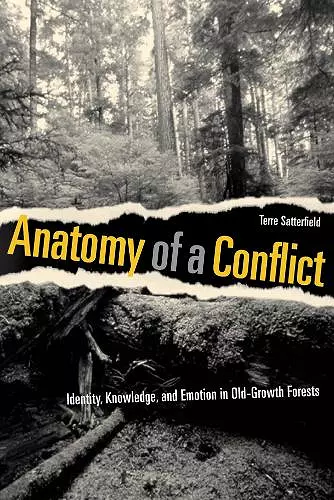Anatomy of a Conflict
Identity, Knowledge, and Emotion in Old-Growth Forests
Format:Paperback
Publisher:University of British Columbia Press
Published:1st Jan '03
Currently unavailable, and unfortunately no date known when it will be back

Anatomy of a Conflict explores the cultural aspects of the fierce dispute between activist loggers and environmentalists over the fate of Oregon’s temperate rain forest. Centred on the practice of old-growth logging and the survival of the northern spotted owl, the conflict has lead to the burning down of ranger stations, the spiking of trees, logging truck blockades, and countless demonstrations and arrests.
Satterfield shows how the debate about the forest is, at its core, a debate about the cultural make-up of the Pacific Northwest. To talk about forests is to talk about culture, whether the discussion is about scientific explanations of conifer forests, activists’ grassroots status and their emotional attachment to land, or the implications of past people’s land use for future forest management. An engaging ethnographic study, this book emphasizes the historical roots and contemporary emergence of identity movements as a means for challenging cultural patterns. It makes a significant contribution to culture- and identity-driven theories of human action in the context of social movements and environmental studies.
This is an excellent work, and is essential reading for those engaged in the sociology of natural resources (a term contested by some), and perhaps for environmental sociologists more broadly. As someone who has a cross-appointment in a Faculty of Forestry, I think this should be required reading for students of forestry. However, I think it should also have broader appeal beyond the academy, to those citizens who are interested in the conflict over old-growth forests. -- David Tindall * Canadian Journal of Sociology, October 2003 *
An excellent piece of ethnographic analysis of value not only to scholars interested in environmental issues but to those working in the wider field of human ecology and in related areas of identity, political process, emotion, science, and the general construction of cultural conventions. -- Kay Milton, Reader in Social Anthropology at Queen's University Belfast, author of Environmentalism and Cultural Theory: Exploring the Role of Anthropology in Environmental Discourse and Loving Nature: Towards an Ecology of Emotion
This book makes a significant contribution to our understanding of environmental controversies. While economic and political dimensions of forest controversies have been closely studied, the anthropological perspective provided by this book is novel, and important. -- Stephen Bocking, Professor of Environmental Studies at Trent University, author of Ecologists and Environmental Politics: A History of Contemporary Ecology
- Winner of K.D. Srivastava Award, UBC Press 2002 (Canada)
ISBN: 9780774808934
Dimensions: unknown
Weight: 320g
208 pages